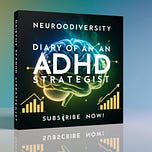The Friendship Puzzle
Sarah sat alone at lunch again, watching other kids laughing and chatting in groups. At 12 years old, she was bright, energetic, and full of creative ideas, but making friends felt like trying to solve a puzzle with missing pieces.
Her ADHD made social interactions unpredictable - sometimes she'd talk too much, interrupt conversations, or completely miss social cues that seemed obvious to others. "Why is this so hard for me?" she wondered, fighting back tears as she picked at her sandwich.
That afternoon, her mom found her bedroom door locked and gentle sobbing from inside. "Nobody wants to be my friend," Sarah whispered when she finally opened the door. "I try so hard, but I always mess it up in the end."
Sarah's struggle isn't unique. For millions with ADHD, the universal human need for connection collides with neurological differences that make social navigation extraordinarily more difficult.
The friendship journey with ADHD can feel like trying to follow an unwritten rulebook that everyone else somehow already knows.
sometimes she'd talk too much, interrupt conversations
Breaking It Down: What's This All About?
Attention-Deficit/Hyperactivity Disorder (ADHD) is a neurodevelopmental condition characterized by persistent patterns of inattention and/or hyperactivity-impulsivity that significantly interfere with daily functioning and development.
While diagnostic criteria focus primarily on attention and behavior challenges, the social domain is increasingly understood as a critical area affected by this condition.
The friendship struggles aren't just side effects—they're directly connected to core ADHD traits.
Research reveals that between 50% and 60% of children with ADHD experience peer rejection, compared to only 13% to 16% of typically developing children. These social challenges often persist into adolescence and adult years.
Why This Matters
Friendships aren't just nice to have—they're essential for emotional well-being, contributing significantly to self-esteem, sense of belonging, and overall life satisfaction. For people with ADHD, positive social relationships play a vital role in:
Promoting emotional health and reducing feelings of isolation
Providing stability and security in an often chaotic internal world
Potentially improving academic or work performance through increased motivation and focus
Creating opportunities for social learning and development of crucial interpersonal skills
Buffering against depression, anxiety, and other mental health challenges too.
When friendship difficulties go unaddressed, the consequences ripple through all aspects of life.
Long-term studies show that early social rejection can have lasting negative impacts on self-esteem and confidence, creating reluctance to engage socially and further hindering development of essential social skills.
sense of belonging, and overall life satisfaction. For people with ADHD
The Science Behind It
Research consistently shows that specific ADHD characteristics directly impact social interactions in predictable yet complex ways:
1. Attention Challenges
Studies demonstrate that difficulties with attention can lead to missing crucial social cues—body language, facial expressions, tone of voice, and implied meanings in conversations. This makes it hard to "read between the lines" in social exchanges, resulting in misunderstandings and inappropriate responses too.
2. Impulsivity Effects
Research by Pelham and Bender found that many children with ADHD are disliked by peers within minutes of initial interaction. Impulsivity manifests as interrupting, finishing others' sentences, blurting inappropriate comments, or making rash decisions that negatively impact social situations.
3. Emotional Regulation Challenges
A 2023 review indicated that emotional dysregulation may be a fundamental underlying cause of social challenges in ADHD. Many experience Rejection Sensitive Dysphoria (RSD)—intense emotional sensitivity to perceived rejection that can significantly impact willingness to initiate and maintain social connections.
4. Executive Function Impacts
Executive functions—working memory, cognitive flexibility, inhibitory control, planning, and organization—are frequently impaired in ADHD. These deficits extend beyond academic challenges to significantly impact friendships and social functioning.
5. Social Preference Differences
Interestingly, research by Heiman (2005) revealed that children with ADHD tend to prioritize "fun" and "mutual entertainment" in friendships, while typically developing children place higher value on emotional support and security. This fundamental difference can lead to misunderstandings and unmet needs.
Making It Work: How to Apply This in Real Life
Building strong friendships with ADHD requires specific strategies tailored to address the unique challenges. Here's a step-by-step approach to developing meaningful social connections now:
✅ Step 1: Build Self-Awareness –
Understand your specific social strengths and challenges by reflecting on past interactions or seeking feedback from trusted friends or family.
✅ Step 2: Develop Communication Tools –
Learn and practice active listening, "the echo" technique (summarizing what you heard), and having conversation starters ready to reduce social anxiety too.
✅ Step 3: Create External Systems –
Use calendars, reminders, and organizational tools to manage social commitments, remember important dates, and be punctual for social events.
✅ Step 4: Practice Emotional Regulation –
Develop techniques to manage intense emotions, cope with frustration, and address rejection sensitivity through mindfulness and self-calming strategies first.
✅ Step 5: Find Your People –
Seek out activities and groups based on genuine interests where you can connect with like-minded individuals who share your passions deeply.
✅ Step 6: Communicate Openly – Consider sharing about your ADHD with close friends to foster understanding and create space for honest conversations about needs and challenges together.
✅ Step 7: Celebrate Your Strengths –
Recognize and embrace the unique qualities you bring to friendships, such as creativity, enthusiasm, empathy, and authentic connections.
Real-Life Examples in Action
The Case of Michael (Adult with ADHD) Michael struggled with maintaining friendships throughout his life, often forgetting to respond to messages or seeming disinterested when his mind wandered during conversations.
After diagnosis and treatment in his 30s, he implemented specific strategies:
He created a "friendship maintenance system" with scheduled reminders to check in with friends and digital notes about their important life events.
He explained to close friends how his ADHD affected his social interactions, which created understanding rather than assumptions of disinterest.
He focused on building deeper connections with fewer people rather than trying to maintain many superficial relationships.
The result: Michael now maintains several close, fulfilling friendships where both he and his friends feel valued and understood completely.
The Story of Jasmine (Teen with ADHD) Jasmine experienced frequent peer rejection in middle school due to interrupting, impulsive comments, and emotional reactivity. With support from her parents and a therapist, she:
Joined a drama club where her expressiveness and creativity were strengths rather than liabilities.
Learned specific social scripts and practiced conversation skills through role-playing.
Developed a subtle signal system with close friends to alert her when she was talking too much or interrupting.
The outcome: Jasmine found "her people" who appreciated her energy and passion while helping her navigate social situations with greater confidence too.
Pro Tips & Insider Insights
🔍 Look for "Green Flag" Friends – The most successful friendships for people with ADHD often involve people who are patient, direct communicators, flexible about plans, and have a good sense of humor too.
🔍 Use the "Friendship Maintenance Menu" – Create tiers of friendship (close, casual, acquaintance) with appropriate expectations and contact frequency for each to avoid social overwhelm and burnout quickly.
🔍 Embrace "Activity Friendships" – Some of the best connections happen when engaged in shared activities that naturally provide structure and focus for social interaction, reducing the challenges of unstructured conversation alone.
🔍 Practice the Pause – Develop the habit of pausing before speaking or responding, creating space to consider others' perspectives and manage impulsive comments better.
🔍 Schedule Recovery Time – Social interactions can be mentally exhausting for many with ADHD, so explicitly plan downtime after socializing to recharge your social battery.
Quick Cheat Sheet (Summary of Key Takeaways)
🔹 ADHD directly impacts social skills through attention, impulsivity, emotional regulation, and executive function challenges.
🔹 Research shows 50-60% of children with ADHD experience peer rejection, with effects often persisting into adulthood.
🔹 Positive friendships can significantly improve overall well-being and act as protective factors against depression and anxiety.
🔹 External systems (reminders, calendars) can compensate for executive function challenges in maintaining social commitments.
🔹 Finding friendship environments that match your interests creates natural opportunities for meaningful connections.
Further Reading (Books & Resources)
📖 Making the Connection: A Parent's Guide to Friendship Development in Children with ADHD – Fred Frankel & Cynthia A. Whitham
📖 ADHD & Us: A Couple's Guide to Loving and Living with Adult ADHD – Anita Robertson LCSW
📖 Taking Charge of ADHD: The Complete, Authoritative Guide for Parents – Russell A. Barkley
📖 The ADHD Effect on Marriage: Understand and Rebuild Your Relationship in Six Steps – Melissa Orlov
Practical Tools & Apps
🔧 Habitica – Gamifies habit-building, including social commitments and friendship maintenance
🔧 FocusMate – Virtual coworking platform that provides structured social interaction
🔧 Meetup – Find local groups based on shared interests to meet like-minded people
🔧 Todoist – Task management app that can help schedule social events and reminders
Research & Studies Section (Citations & Sources)
Helping Kids with ADHD Make Friends - Rising Above ABA, accessed March 22, 2025
Why can't we be friends? A narrative review of the challenges of making and keeping friends for children and adolescents with Attention-Deficit/Hyperactivity Disorder - Frontiers, 2024
ADHD and Friendships: Making and Keeping Friends - Healthline, accessed March 22, 2025
Friendship matters—An interview study with adolescents with attention deficit hyperactivity disorder - PLOS Mental Health, 2023
Social functioning difficulties in ADHD: Association with PDD risk - PMC, accessed March 22, 2025
Relationships & Social Skills - CHADD, accessed March 22, 2025
The friendships of children and youth with attention-deficit hyperactivity disorder: A systematic review - PMC, accessed March 22, 2025
A Review of Peer Relationships and Friendships in Youth With ADHD - e-Publications@Marquette, 2022
Whay Now!
Remember, friendship skills can be learned and strengthened with practice. Start with just one strategy from this article today. Be patient with yourself, celebrate small victories, and know that meaningful connections are possible with ADHD too.
🎧 For more insights, check out this Diary of a ADHD strategist podcast:













Share this post